Contents
- 1 Setting the Stage: A Familiar Plot with a Twist of Style
- 2 Vijay’s Dual Roles: A Celebration of the Actor’s Range
- 3 A Stellar Cast and the Power of Nostalgia
- 4 A Revenge Story at Its Core
- 5 The Film’s Drawbacks: Action, Music, and a Weak Antagonist
- 6 Women in GOAT: Damsels in Distress
- 7 The Final Verdict: Fan Service Over Story
The Greatest of All Time (GOAT) Movie Review: Vijay and Venkat Prabhu’s Tribute to Fan Service Over Storytelling
The release of The Greatest of All Time (GOAT), directed by Venkat Prabhu and starring Tamil superstar Vijay, was eagerly anticipated by fans worldwide. For those expecting a hard-hitting espionage thriller or a genre-defining cinematic experience, GOAT may not be the fulfilling experience they were hoping for. However, for the true Vijay devotee, this film is nothing short of a love letter—packed with nostalgia, fan service, and moments designed to appeal directly to the actor’s loyal fanbase.
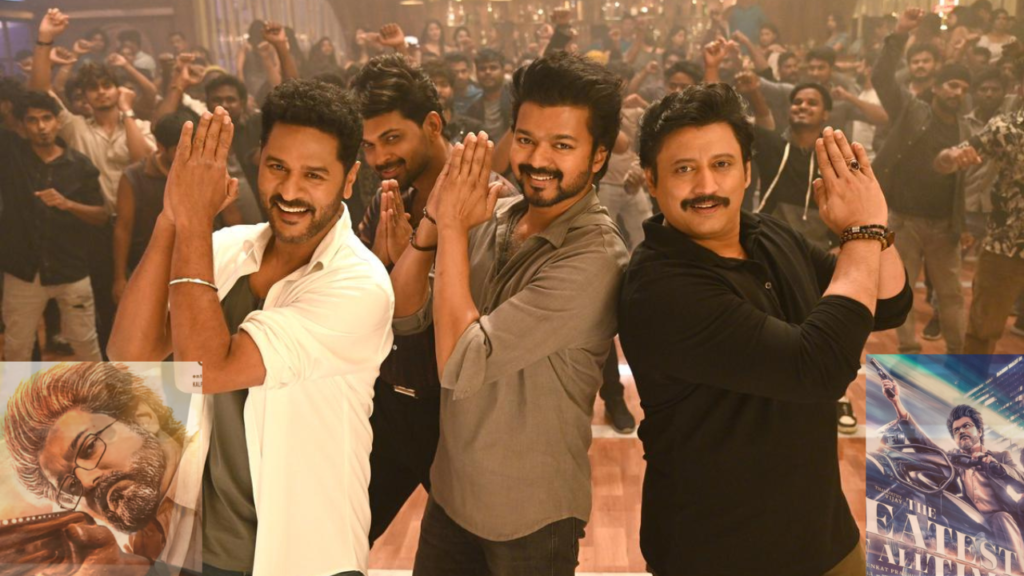
Though the film has its flaws, including a predictable plot and an underwhelming antagonist, it compensates with ample references to Vijay’s iconic career and an abundance of moments crafted to incite cheers from the audience. Let’s dive deeper into why GOAT serves as a testament to the power of theatrical fan service.
Setting the Stage: A Familiar Plot with a Twist of Style
The film opens on a high note with Gandhi (Vijay), a seasoned agent leading a covert team on a recovery mission. The antagonist, Rajiv Menon (played by Mohan), presents a formidable challenge, but Gandhi’s suave demeanor and characteristic swagger set the tone for an action-packed narrative. Before Gandhi can deliver the final blow to Rajiv, his hand is stayed by a friend, marking the beginning of a storyline that feels more like a tribute to Vijay’s previous works than an innovative narrative.
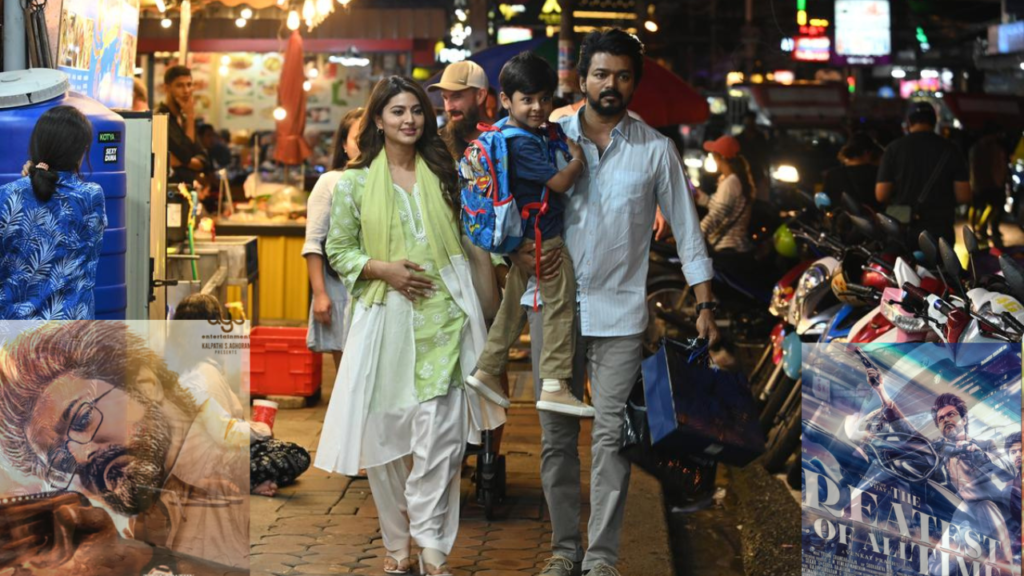
At its core, GOAT follows the exploits of Gandhi and his Special Anti-Terrorism Squad, consisting of key players like Sunil (Prashanth), Ajay (Ajmal), Kalyan (Prabhu Deva), and their chief Nazeer (Jayaram). While many spy thrillers use themes of patriotism to drive their plot forward, GOAT is refreshingly devoid of these tropes. Instead, we see the characters as regular office-goers—colleagues and friends sharing camaraderie and banter. Gandhi’s wife, Anu (Sneha), is unimpressed with the way work intrudes on their personal lives, giving the characters a relatable, human touch.
Yet, this normalcy is soon disrupted by tragedy, catapulting the narrative from a calm, everyday scenario to a whirlwind of action and revenge. The film shifts from 2008 to the present, and as expected, things quickly escalate.
Vijay’s Dual Roles: A Celebration of the Actor’s Range
One of the most prominent highlights of GOAT is Vijay’s portrayal of not one but two characters: Gandhi and his son Jeevan. This dual role gives the actor the perfect opportunity to flex his well-established acting muscles, both as a mature, grief-laden father and a young, energetic son. It is this duality that anchors the movie.
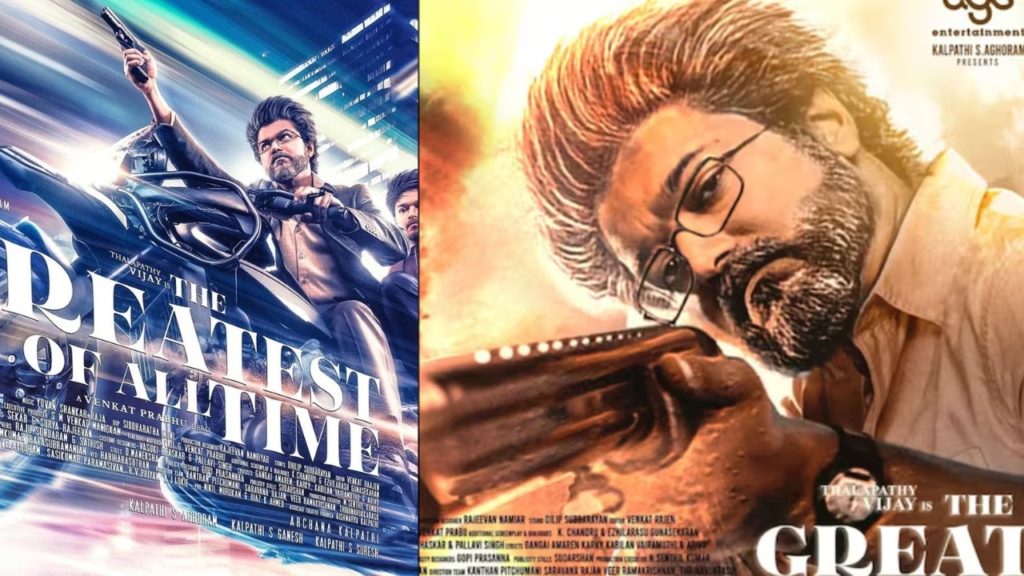
As Gandhi, Vijay gives a performance filled with the gravity of loss and the responsibility of protecting those he loves. One particular scene, where Gandhi must grapple with a personal tragedy, stands out for its emotional depth and allows Vijay to showcase his acting prowess. The seasoned actor brings intensity to this role, reminding viewers of his capacity to handle emotionally charged scenes.
However, his role as Jeevan, Gandhi’s young and impulsive son, truly steals the show. Jeevan’s character is brimming with the charm, mischief, and youthful energy that Vijay’s fans adore. The de-aging technology used to portray a younger Vijay initially met with criticism during the promotional phase, is handled with care, offering a convincing portrayal that successfully taps into nostalgia. For fans who’ve followed Vijay’s journey through cinema, seeing him as Jeevan—reminiscent of his earlier roles—is nothing short of exhilarating.
A Stellar Cast and the Power of Nostalgia
Beyond Vijay’s dual performance, GOAT boasts an impressive ensemble cast, including Prashanth, Prabhu Deva, and Ajmal, all seasoned actors in their own right. Their presence, though sometimes feeling more like glorified cameos, adds weight to the film, giving it an Expendables-like quality. The chemistry between the team members feels authentic, and the veterans bring their experience to the forefront, adding depth to their interactions. The camaraderie between the characters feels genuine, which helps elevate what might otherwise be standard action-thriller fare.
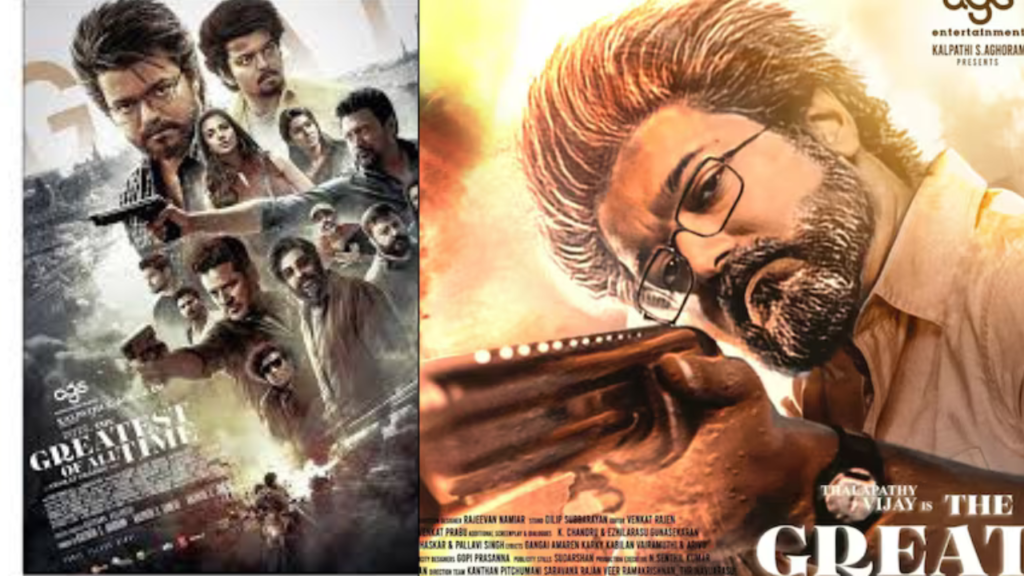
Despite the strength of the ensemble, GOAT remains firmly Vijay’s film. Every sequence, every punchline, and every action set piece is designed to celebrate him as a star. For fans of the actor, these moments are delightful, filled with callbacks to his previous films, iconic dance moves, and even subtle political references. The fan service is undeniable, and at times, it overshadows the story itself.
What’s particularly interesting about GOAT is how it also incorporates nods to Vijay’s peers, especially Rajinikanth and Kamal Haasan, both legendary actors in Tamil cinema. These references are a treat for cinephiles who enjoy catching subtle homages to their favorite stars.
A Revenge Story at Its Core
At its heart, GOAT is a revenge thriller. Gandhi, a retired Anti-Terrorism Squad agent, is forced back into action when his past returns to haunt him. While the premise has potential, the narrative structure feels predictable, borrowing heavily from tropes we’ve seen in similar films. The movie echoes elements of Vijayakanth’s Rajadurai, a 1993 film helmed by Vijay’s father, S. A. Chandrasekhar. This homage is evident, especially since one of the characters in GOAT is named Vijay, mirroring the younger version of Vijayakanth’s character.
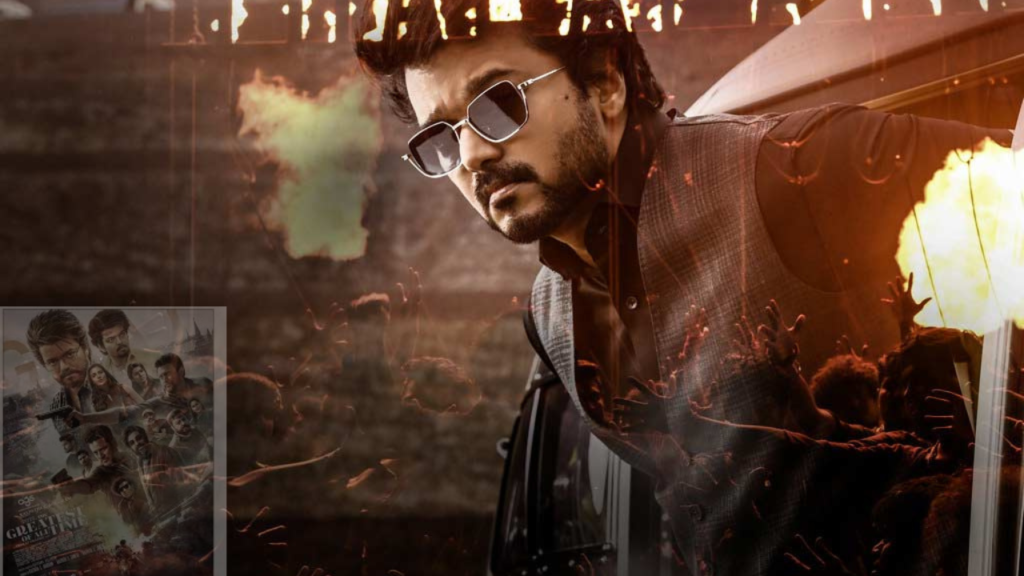
The problem lies in how the film stretches its plot too thin over 179 minutes, creating moments of narrative drag. The revenge arc, though compelling in some parts, often feels sidelined by the need to cater to fan service and elaborate set pieces.
The Film’s Drawbacks: Action, Music, and a Weak Antagonist
While GOAT delivers on fan service, it falters in areas where a film of this scale should shine. Despite being choreographed to showcase Vijay’s heroics, the action sequences lack the excitement one would expect from a film centered around espionage. They are often repetitive, failing to provide the kind of thrills seen in Venkat Prabhu’s previous works like Maanaadu.
Equally disappointing is the film’s soundtrack and background score. For a film that places so much importance on creating larger-than-life moments, the music falls short of amplifying those scenes. Songs fail to leave a lasting impact, and the background score, while serviceable, does little to heighten the stakes of the film’s major set pieces.
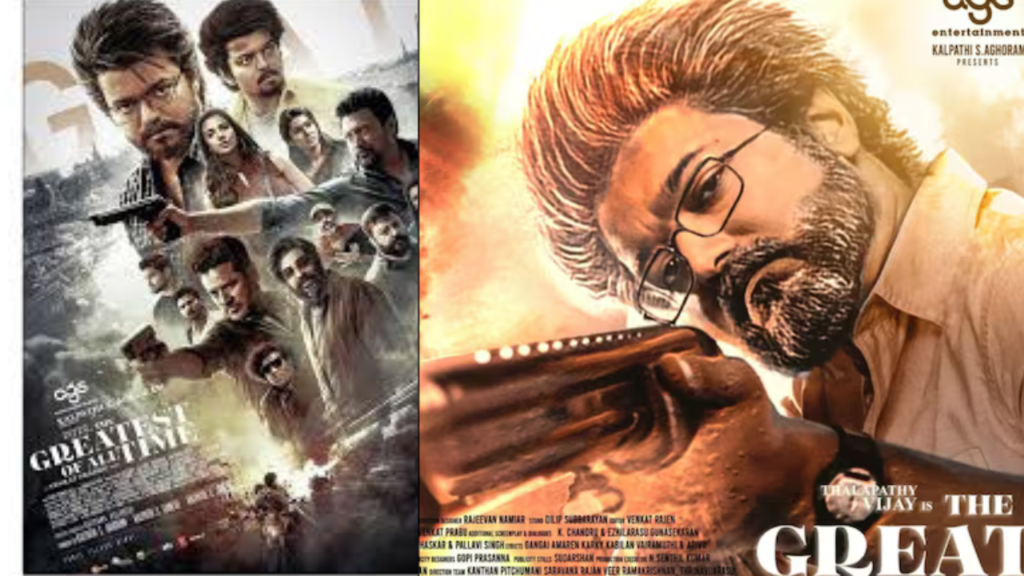
Perhaps the biggest drawback is the film’s antagonist, Rajiv Menon. Despite being portrayed by the veteran actor Mohan, the character feels underwritten, one-dimensional, and uninteresting. Given Mohan’s acting caliber, it’s unfortunate that the role doesn’t allow him to shine. His motivations remain vague, and he often comes across as a generic villain rather than a formidable foe for the film’s hero.
Women in GOAT: Damsels in Distress
Another criticism of GOAT is its treatment of female characters. Despite having a strong cast that includes Sneha and Meenakshi Chaudhary, the film relegates its female leads to the sidelines. They often find themselves in distress, needing to be saved, rather than being active participants in the story. This reliance on old tropes feels outdated in an era where audiences expect more well-rounded female characters.
The Final Verdict: Fan Service Over Story
In conclusion, GOAT may not be a groundbreaking or thought-provoking film, but it succeeds in one crucial area: delivering fan service. Venkat Prabhu’s decision to lean into the celebration of Vijay’s stardom is both the film’s greatest strength and its most glaring weakness. For those seeking a thrilling espionage adventure with a tightly written plot, GOAT will likely disappoint. Its predictable storyline, unremarkable action sequences, and underutilized supporting characters leave much to be desired.
However, for die-hard fans of Vijay, GOAT is a triumph. It’s a film designed to evoke cheers, applause, and nostalgia—a cinematic celebration of everything fans have come to love about the actor. From the subtle nods to his earlier films to the unmistakable references to his political ambitions, GOAT is a film tailor-made for Vijay’s most ardent supporters.
Ultimately, GOAT reminds us that a lion, even in a less-than-perfect setting, is still a lion. Despite its flaws, Vijay’s star power shines through, making the film worth watching for his fans. Whether you view it as a flawed revenge thriller or a joyous tribute to one of Tamil cinema’s biggest stars, The Greatest of All Time will leave you entertained—if not fully satisfied.